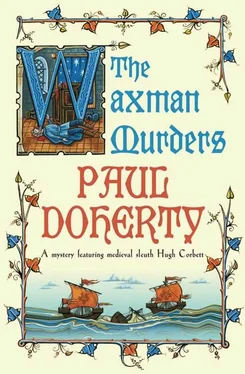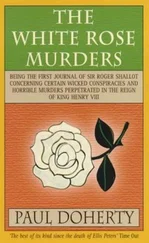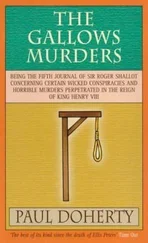Paul Doherty - The Waxman Murders
Здесь есть возможность читать онлайн «Paul Doherty - The Waxman Murders» весь текст электронной книги совершенно бесплатно (целиком полную версию без сокращений). В некоторых случаях можно слушать аудио, скачать через торрент в формате fb2 и присутствует краткое содержание. Год выпуска: 0101, Жанр: Исторический детектив, на английском языке. Описание произведения, (предисловие) а так же отзывы посетителей доступны на портале библиотеки ЛибКат.
- Название:The Waxman Murders
- Автор:
- Жанр:
- Год:0101
- ISBN:нет данных
- Рейтинг книги:3 / 5. Голосов: 1
-
Избранное:Добавить в избранное
- Отзывы:
-
Ваша оценка:
- 60
- 1
- 2
- 3
- 4
- 5
The Waxman Murders: краткое содержание, описание и аннотация
Предлагаем к чтению аннотацию, описание, краткое содержание или предисловие (зависит от того, что написал сам автор книги «The Waxman Murders»). Если вы не нашли необходимую информацию о книге — напишите в комментариях, мы постараемся отыскать её.
The Waxman Murders — читать онлайн бесплатно полную книгу (весь текст) целиком
Ниже представлен текст книги, разбитый по страницам. Система сохранения места последней прочитанной страницы, позволяет с удобством читать онлайн бесплатно книгу «The Waxman Murders», без необходимости каждый раз заново искать на чём Вы остановились. Поставьте закладку, и сможете в любой момент перейти на страницу, на которой закончили чтение.
Интервал:
Закладка:
At last the grim tower of St Pancras loomed above the trees. Corbett relaxed as he smelt wood smoke and the tasty odours of food mixed with the acrid tang of horse and hay. He crossed a small footbridge, up a path and through a crumbling lychgate into God’s acre. The church was nothing more than an old barn-like structure under a much-decayed sloping roof, with a squat ugly tower built on one side. Its lancet windows were boarded up, as was the old porch door. Corbett went round the church and heaved a sigh of relief. Les Hommes Joyeuses were already aroused, their gaudily covered carts lined up before the old priest’s house. The fence around this had crumbled, its thatched roof sagged, whilst the door and shutters hung loose. Fires had been lit and women were preparing small cauldrons of oatmeal or laying strips of salted meat across makeshift grills. A man came from behind a wagon, an arrow notched to his bow. Corbett put his arbalest down and lifted both hands in a sign of peace; in this poor light he didn’t want to make a mistake.
‘Greetings,’ he called out. ‘Greetings to Les Hommes Joyeuses. I seek the Gleeman.’
‘Sir Hugh.’ The Gleeman, hood pushed back, came out of the priest’s house shouting at the bowman not to be a fool, and beckoned Corbett forward.
Chapter 7
Hominum que contente mundique
huius et cupido.
Man’s struggle with man and the
lust of the world.
Medieval poemThe clerk went into the small hall of the priest’s house. This had been cleared, the floor scoured; a weak fire crackled in the hearth and the narrow windows were blocked with blackened straw. The Gleeman asked the woman tending the hearth and the children clinging to her robe to leave. He invited Corbett to sit on a stool by the fire whilst he squatted down next to him, his back to the inglenook, as if they were old comrades, which in truth they were. Corbett waited until the small hall was emptied, then extended his right hand. The wind-chapped face of Robert Ormesby, former clerk, now Gleeman of Les Hommes Joyeuses, broke into a smile. Neither Ranulf nor even the King knew that Ormesby was Corbett’s spy. Corbett paid him directly from his own purse for the information he collected as he and his troupe wandered the wealthy towns and villages in the east and south of the kingdom.
‘A mere coincidence,’ Ormesby whispered, ‘meeting you on Harbledown Hill.’ He forced a smile. ‘The minute I heard about three horsemen led by a king’s clerk, I guessed who it was.’ He gestured round. ‘I thank you for our lodgings.’
‘You are well?’ Corbett leaned closer to the fire.
‘I still have dreams, nightmares,’ Ormesby muttered, not meeting Corbett’s eyes.
‘About Stirling?’
The Gleeman looked away, breathing quickly as he strove to clear his mind of that fatal battle six years earlier when the Scottish leader Wallace had trapped the English vanguard at Stirling Bridge.
‘I still see them,’ he muttered, ‘the Scots, a mass of men bristling with steel tips like some huge, malevolent hedgehog advancing towards us, great horns blasting, war cries ringing out. Cressingham, that stupid bastard!’
Corbett just stared into the flames. He’d lost other friends, mailed clerks, at that disaster when Hugh de Cressingham, Knight of the Swan and Edward’s treasurer in Scotland, had insisted on his hasty advance across Stirling Bridge, walking straight into Wallace’s trap. For men like the Gleeman, the only consolation was that Cressingham himself had been dragged from his saddle and killed, his fat corpse skinned to make tokens for the Scots; Wallace had even made a belt out of the piece given to him. King Edward had hurried into Scotland and reversed the defeat by his victory at Falkirk, but Ormesby had seen enough. He left the royal service, moved to a village outside Glastonbury and married a local girl. She had died in childbirth, so Ormesby had used his little wealth to finance Les Hommes Joyeuses and assumed the role of the Gleeman, their leader. Corbett had met him three years earlier during a commission of oyer and terminer in Essex, and promptly recruited him. Ormesby roamed the roads and collected all the gossip and tittle-tattle which Corbett could sift on behalf of his royal master.
‘And your news?’
‘I received your letter before the snows came,’ the Gleeman replied. ‘We moved into Suffolk, following the River Denham, making enquiries amongst the villagers, the wise women, the tavern-hunters, the wandering chapmen. It’s true, Sir Hugh.’ The Gleeman’s eyes glittered greedily. ‘There’s gossip,’ he whispered, ‘about what they call the Haunt of Ghosts.’
‘The Haunt of Ghosts?’
‘A lonely place, Sir Hugh, desolate moorland except for a dozen tumuli or grave-mounds, not far from the Denham. The gossip is that in ancient times a great king, with a treasure hoard beyond all expectation, was buried somewhere close. People have searched for it but nothing’s been found. A local priest talks of maps and charts, but. .’ He shook his head.
‘And recently?’ Corbett asked.
‘A bailiff near Denham said that about three or four years ago strangers came into the area asking about the local lore and legend, but he cannot remember their names or faces. Sir Hugh,’ Ormesby jabbed a finger in the air, ‘a great treasure does exist. There have been enquiries recently, nothing precise, just whispers, like the breeze on a summer’s evening.’
‘But there has been no report of diggings, of anyone searching for the treasure?’
‘As I said, local lore and legend, recent enquiries, strangers coming in and out with heads hooded and faces hidden. You must remember, Sir Hugh, it’s a busy place, people passing to and fro from Ipswich and the other market towns. The legends are so ancient no one really pays much attention.’
‘And Blackstock, The Waxman ?’
‘Well known along the Colvasse peninsula. The Waxman often slipped into the coves and inlets around Orwell. Blackstock was respected and liked, regarded as a hero. He and his men never plundered or pillaged. They paid good prices to the local peasant farmers and kept the peace. Blackstock restocked and refurbished his ship, filled water barrels and slipped away like a sea mist.’
‘And his half-brother, Hubert the Monk?’
‘Again, gossip, but no one ever saw him. People said that Blackstock would meet someone, probably Hubert, at a derelict hermitage on the River Orwell.’ He paused. ‘Ah yes, that’s its name: St Simon of the Rocks. The locals also claim Blackstock was probably heading there when he was trapped by two war cogs against the coast in the October of 1300. The villagers still talk of the sea fight which took place. How afterwards Sir Walter Castledene’s ship The Caltrop sailed into Orwell with Blackstock’s corpse dangling by its neck from the poop. To be sure, Sir Hugh, the peasants did not like that.’ The Gleeman thrust a small log and some kindling into the charcoal now glowing strongly in the hearth. He turned, wiping his hands. ‘Do you want something to eat or drink?’
‘No, no thank you.’
The Gleeman got up and went into an adjoining room, probably the buttery, coming back with a tankard of ale and a hunk of bread. He drank and ate noisily.
‘A bloody sea fight!’ he said between mouthfuls.
‘Were there any survivors?’
‘Oh yes. According to the villagers, Castledene did the same as Blackstock had done to his crews. I believe he hanged his prisoners though he may have thrown some of them overboard. They could either drown or make their way to the shore; that’s where Castledene made a mistake. You see, Sir Hugh, along most coastlines shipwrecked sailors are shown very little mercy, but Blackstock and his crew were liked. One man survived and he was helped. No one knew his name. He was sea-soaked, half dead; they gave him some hot oatmeal, dried his clothes and sent him on his way.’
Читать дальшеИнтервал:
Закладка:
Похожие книги на «The Waxman Murders»
Представляем Вашему вниманию похожие книги на «The Waxman Murders» списком для выбора. Мы отобрали схожую по названию и смыслу литературу в надежде предоставить читателям больше вариантов отыскать новые, интересные, ещё непрочитанные произведения.
Обсуждение, отзывы о книге «The Waxman Murders» и просто собственные мнения читателей. Оставьте ваши комментарии, напишите, что Вы думаете о произведении, его смысле или главных героях. Укажите что конкретно понравилось, а что нет, и почему Вы так считаете.












